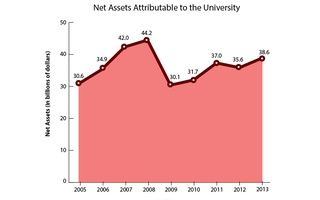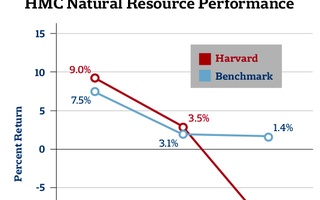Harvard Management Company employees accused the University’s troubled investment arm of setting artificially low benchmarks and overcompensating top managers, criticizing their employer extensively in a 2015 internal review, Bloomberg reported Thursday.
The 78-page PowerPoint review, compiled by the consulting firm McKinsey and Company and never released publicly, examined what it calls the “performance paradox” of Harvard’s $35.7 billion endowment: While the University has lagged behind peers for years, it has frequently surpassed its own internal benchmarks. Fiscal year 2016 marked the first year since FY 2009 that HMC did not beat its overall internal goal, returning a “disappointing” negative 2 percent and coming in second-to-last in the Ivy League.
HMC employees did not mince words in describing their employer to McKinsey, characterizing the culture of HMC as “lazy, fat and stupid” and centered on “stable, rather than smart, capital,” according to Bloomberg.
The McKinsey report, which studied fiscal years 2009 through 2014, blamed easily attainable benchmarks—so-called “‘slow rabbits’”—for creating a culture of complacency at HMC, Bloomberg reported.
“This is the only place I’ve seen where people can negotiate the benchmark they get compensated on,” read one “representative quote” from an HMC employee in the McKinsey review.
“There were so many side deals cut during the crisis – bad stuff moved out of portfolios and benchmarks adjusted – individual performance bears little resemblance to fund performance and we somehow seem OK with that,” read another quote, according to Bloomberg.
Starting in 2017, “compensation paid to internal investment managers will tie a meaningful share of variable compensation to HMC’s overall performance,” HMC spokesperson Emily Guadagnoli wrote in an emailed statement.
Due to the firm’s poor performance in FY 2016, Guadagnoli continued, “current and former investment managers will forfeit compensation that was held back in prior years.”
Elsewhere in the review, McKinsey warned that Harvard’s endowment—currently the world’s largest—could be outsized by Yale’s within 20 years, according to Bloomberg. Many financial experts see the Yale Investment Office, which returned a dominating 3.4 percent on its endowment in FY 2016, as a potential model for how Harvard should structure its management company. Since FY 2006, Yale has outpaced Harvard every year except two.
“Harvard shouldn’t stand for mediocrity, but that’s where we’re heading if this continues,” one HMC employee told McKinsey.
Still, the review was not entirely critical: McKinsey noted that riskier alternative assets like real estate and natural resources had performed strongly over the period studied, though they were judged by a “less aggressive” benchmark compared to peer institutions. In FY 2016, however, natural resources took a downward turn, returning negative 10.2 percent against a benchmark of 1.4 percent.
According to Bloomberg, McKinsey also advised expanding HMC’s internal trading team. Instead, the firm recently reduced the size of its internal public equities team, and University President Drew G. Faust has indicated that more investing teams may be outsourced on the basis of performance in the future.
Former Columbia investment chief N.P. Narvekar will be tasked with turning HMC around when he arrives as its next CEO this December.
—Staff writer Daphne C. Thompson can be reached at daphne.thompson@thecrimson.com. Follow her on Twitter @daphnectho.
Read more in University News
Cybersecurity Experts Discuss Hacking Election TechnologyRecommended Articles
-
Listen to the ExpertsLast fall, responding to abnormally high levels of student dissatisfaction, Harvard Law School (HLS) commissioned McKinsey & Co. to survey
-
 University Report Reveals Mixed Financial Outlook
University Report Reveals Mixed Financial Outlook -
 Case Study: Consulting After College
Case Study: Consulting After College -
 Endowment’s Performance Is Concerning, Faust Says
Endowment’s Performance Is Concerning, Faust Says -
 HMC to 'Refine' Natural Resources Investing
HMC to 'Refine' Natural Resources Investing













